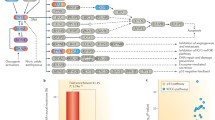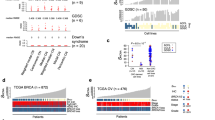Abstract
Aneuploidy, an aberrant number of chromosomes, is a very common characteristic of many types of cancers, including tumors of the breast. There is increasing evidence that defects in the spindle assembly checkpoint, which controls correct chromosome segregation between two daughter cells, might contribute to tumorigenesis. In the present study we examined the effect of promoter and coding single nucleotide polymorphisms (SNPs) in six major spindle checkpoint genes (BUB1B, BUB3, CENPE, MAD2L1, MAD2L2, TTK) on familial breast cancer (BC) risk. A case–control study was carried out with a total of nine SNPs using 441 German, familial BC cases and 552 controls matched by age, ethnicity and geographical region. Neither the individual SNPs in the studied genes nor the haplotypes in the BUB1B, CENPE and TTK genes caused any significant effect on the risk of BC. We used the multifactor-dimensionality reduction method in order to identify gene-gene interactions among the six mitotic checkpoint genes, but no association was detected. Therefore, our results indicate that the investigated SNPs in the mitotic checkpoint genes do not affect the risk of familial BC.

Similar content being viewed by others
References
Parkin DM, Bray F, Ferlay J, Pisani P (2005) Global cancer statistics, 2002. CA Cancer J Clin 55:74–108
Lengauer C, Kinzler KW, Vogelstein B (1998) Genetic instabilities in human cancers. Nature 396:643–649
Weaver BA, Cleveland DW (2006) Does aneuploidy cause cancer? Curr Opin Cell Biol 18:658–667
Kops GJ, Weaver BA, Cleveland DW (2005) On the road to cancer: aneuploidy and the mitotic checkpoint. Nat Rev Cancer 5:773–785
Bharadwaj R, Yu H (2004) The spindle checkpoint, aneuploidy, and cancer. Oncogene 23:2016–2027
Taylor SS, Scott MI, Holland AJ (2004) The spindle checkpoint: a quality control mechanism which ensures accurate chromosome segregation. Chromosome Res 12:599–616
Baker DJ, Chen J, van Deursen JM (2005) The mitotic checkpoint in cancer and aging: what have mice taught us? Curr Opin Cell Biol 17:583–589
Babu JR, Jeganathan KB, Baker DJ, Wu X, Kang-Decker N, van Deursen JM (2003) Rae1 is an essential mitotic checkpoint regulator that cooperates with Bub3 to prevent chromosome missegregation. J Cell Biol 160:341–353
Michel LS, Liberal V, Chatterjee A, Kirchwegger R, Pasche B, Gerald W, Dobles M, Sorger PK, Murty VV, Benezra R (2001) MAD2 haplo-insufficiency causes premature anaphase and chromosome instability in mammalian cells. Nature 409:355–359
Rajagopalan H, Lengauer C (2004) Aneuploidy and cancer. Nature 432:338–341
Yuan B, Xu Y, Woo JH, Wang Y, Bae YK, Yoon DS, Wersto RP, Tully E, Wilsbach K, Gabrielson E (2006) Increased expression of mitotic checkpoint genes in breast cancer cells with chromosomal instability. Clin Cancer Res 12:405–410
Myrie KA, Percy MJ, Azim JN, Neeley CK, Petty EM (2000) Mutation and expression analysis of human BUB1 and BUB1B in aneuploid breast cancer cell lines. Cancer Lett 152:193–199
Li Y, Benezra R (1996) Identification of a human mitotic checkpoint gene: hsMAD2. Science 274:246–248
Percy MJ, Myrie KA, Neeley CK, Azim JN, Ethier SP, Petty EM (2000) Expression and mutational analyses of the human MAD2L1 gene in breast cancer cells. Genes Chromosomes Cancer 29:356–362
Meindl A (2002) Comprehensive analysis of 989 patients with breast or ovarian cancer provides BRCA1 and BRCA2 mutation profiles and frequencies for the German population. Int J Cancer 97:472–480
Houlston RS, Peto J (2003) The future of association studies of common cancers. Hum Genet 112:434–435
Antoniou AC, Easton DF (2003) Polygenic inheritance of breast cancer: Implications for design of association studies. Genet Epidemiol 25:190–202
Wong KK, Tsang YT, Shen J, Cheng RS, Chang YM, Man TK, Lau CC (2004) Allelic imbalance analysis by high-density single-nucleotide polymorphic allele (SNP) array with whole genome amplified DNA. Nucleic Acids Res 32:e69
Paez JG, Lin M, Beroukhim R, Lee JC, Zhao X, Richter DJ, Gabriel S, Herman P, Sasaki H, Altshuler D, Li C, Meyerson M, Sellers WR (2004) Genome coverage and sequence fidelity of phi29 polymerase-based multiple strand displacement whole genome amplification. Nucleic Acids Res 32:e71
Vaclavicek A, Hemminki K, Bartram CR, Wagner K, Wappenschmidt B, Meindl A, Schmutzler RK, Klaes R, Untch M, Burwinkel B, Forsti A (2006) Association of prolactin and its receptor gene regions with familial breast cancer. J Clin Endocrinol Metab 91:1513–1519
Dupont WD, Plummer WD Jr. (1998) Power and sample size calculations for studies involving linear regression. Control Clin Trials 19:589–601
Barrett JC, Fry B, Maller J, Daly MJ (2005) Haploview: analysis and visualization of LD and haplotype maps. Bioinformatics 21:263–265
Ritchie MD, Hahn LW, Roodi N, Bailey LR, Dupont WD, Parl FF, Moore JH (2001) Multifactor-dimensionality reduction reveals high-order interactions among estrogen-metabolism genes in sporadic breast cancer. Am J Hum Genet 69:138–147
Helin K (1998) Regulation of cell proliferation by the E2F transcription factors. Curr Opin Genet Dev 8:28–35
Trimarchi JM, Lees JA (2002) Sibling rivalry in the E2F family. Nat Rev Mol Cell Biol 3:11–20
Karlseder J, Rotheneder H, Wintersberger E (1996) Interaction of Sp1 with the growth- and cell cycle-regulated transcription factor E2F. Mol Cell Biol 16:1659–1667
Carter SL, Eklund AC, Kohane IS, Harris LN, Szallasi Z (2006) A signature of chromosomal instability inferred from gene expression profiles predicts clinical outcome in multiple human cancers. Nat Genet 38:1043–1048
Acknowledgements
The authors are grateful to Julia Schmutzhard, Helmholtz-University Group Molecular Epidemiology, DKFZ, for performance and evaluation of the whole genome amplification. The German breast cancer samples were collected within a project funded by the Deutsche Krebshilfe, supported by the Center of Molecular Medicine Cologne (CMMC), and coordinated by Prof. Rita K. Schmutzler. This study was supported by the Tumorzentrum Heidelberg/Mannheim and a grant from the EU (LSHC-CT-2005–503465).
Author information
Authors and Affiliations
Corresponding author
Rights and permissions
About this article
Cite this article
Vaclavicek, A., Bermejo, J.L., Wappenschmidt, B. et al. Genetic variation in the major mitotic checkpoint genes does not affect familial breast cancer risk. Breast Cancer Res Treat 106, 205–213 (2007). https://doi.org/10.1007/s10549-007-9496-9
Received:
Accepted:
Published:
Issue Date:
DOI: https://doi.org/10.1007/s10549-007-9496-9




